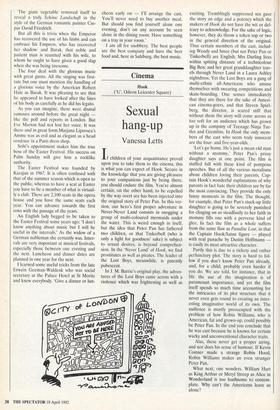Cinema
Hook (`U', Odeon Leicester Square)
Sexual hang-up
Vanessa Letts
If children of your acquaintance prevail upon you to take them to the cinema, this is what you can expect of Hook. Secure in the knowledge that you are giving pleasure to your companions just by being there, you should endure the film. You're almost certain, on the other hand, to be repelled by the way overt sex has been injected into the original story of Peter Pan. In this ver- sion, our hero's first proper adventure in Never-Never Land consists in snogging a group of multi-coloured mermaids under the water. This is weird enough in itself, but the idea that Peter Pan has fathered two children, or that Tinkerbell (who is only a light for goodness' sake) is subject to sexual desires, is beyond comprehen- sion. In the 'Never Land' of Hook, we find prostitutes as well as pirates. The leader of the Lost Boys, meanwhile, is patently pubescent.
In J. M. Barrie's original play, the adven- tures of the Lost Boys came across with a violence which was frightening as well as exciting. Tremblingly suppressed sex gave the story an edge and a potency which the makers of Hook do not have the wit or del- icacy to acknowledge. For the sake of logic, however, they do throw a token sop or two in the general direction of the original.
Thus certain members of the cast, includ- ing Wendy and Smee (but not Peter Pan or Tinkerbell) are English; Mrs Darling lives within spitting distance of a technicolour Big Ben; and her great granddaughter trav- els through Never Land in a Laura Ashley nightdress. Yet the Lost Boys are a gang of multi-ethnic all-Americans who amuse themselves with swearing competitions and skate-boarding. One senses immediately that they are there for the sake of Ameri- can cinema-goers, and that Steven Spiel- berg, the director, is scared stiff that without them the story will come across as too soft for an audience which has grown up in the company of Teenage Ninja Tur- tles and Gremlins. In Hook the only mem- bers of the cast who seem truly innocent are the four- and five-year-olds.
`Let's go home. He's just a mean old man without a mommy,' Peter Pan's prissy daughter says at one point. The film is stuffed full with these kind of pompous speeches. But of all the various moralisms about children loving their parents, Cap- tain Hook's wonderful explanations of why parents in fact hate their children are by far the most convincing. They provide the only funny moments in the film. The thought, for example, that Peter Pan's stuck-up little daughter is going to be severely punished for clinging on so steadfastly to her faith in mommy fills one with a perverse kind of glee. In fact the film as a whole suffers from the same flaw as Paradise Lost, in that the Captain Hook/Satan figure — played with real panache by Dustin Hoffmann is easily its most attractive character.
Partly this is due to a rickety and rather perfunctory plot. The story is hard to fol- low if you don't know Peter Pan already, and, for a child, probably even harder if you do. We are told, for instance, that in life the use of the imagination is of paramount importance, and yet the film itself spends so much time accounting for the intricacies of its plot structure that it never even gets round to creating an inter- esting imaginative world of its own. The audience is mostly preoccupied with the problem of how Robin Williams, who is American, fat and grown-up, could possibly be Peter Pan. In the end you conclude that he was cast because he is known for certain wacky and unconventional character traits.
Alas, these never get a proper airing, and nor does his sense of humour. If Kevin Costner made a strange Robin Hood, Robin Williams makes an even stranger Peter Pan.
What next, one wonders. William Hurt as King Arthur or Meryl Streep as Alice in Wonderland is too loathsome to contem- plate. Why can't the Americans leave us alone?


















































 Previous page
Previous page